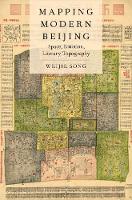


|
|
| book details |
Mapping Modern Beijing: Space, Emotion, Literary Topography
By (author) Weijie Song

|
| on special |
normal price: R 4 293.95
Price: R 4 078.95
|
| book description |
""I have lived in Beijing for thirty years, but I can't say that I have yet comprehended this city,"" wrote Lao Xiang, the great Chinese novelist, in 1935. Mapping Modern Beijing explores the various ways novelists sought to understand and articulate China's second largest city in the first half of twentieth century. Song investigates five modes of representing Beijing: as a warped hometown, a city of snapshots and manners, an aesthetic city, an imperial capital in comparative and cross-cultural perspective, and a displaced city on the Sinophone and diasporic postmemory. Drawing from literary canons to exotic narratives, from modernist poetry to chivalric fantasy, from popular culture to urban planning, this book explores the complex nexus of urban spaces, archives of emotions, and literary topography of Beijing in its long journey from imperial capital to Republican city and to socialist metropolis. While most English-language literary studies of China focus on its rural locales, Song's study presents a welcome departure, expanding our understandings of Chinese literature into the urban and the modern.
| product details |

Normally shipped |
Publisher | Oxford University Press Inc
Published date | 29 Mar 2018
Language |
Format | Hardback
Pages | 320
Dimensions | 163 x 239 x 28mm (L x W x H)
Weight | 567g
ISBN | 978-0-1902-0067-1
Readership Age |
BISAC | literary criticism / asian / chinese
| other options |
|
|
|
To view the items in your trolley please sign in.
| sign in |
|
|
|
| specials |
|
|
|

|
Mason Coile
Paperback / softback
224 pages
was: R 520.95
now: R 468.95
|
A terrifying locked-room mystery set in a remote outpost on Mars.
|
An epic love story with the pulse of a thriller that asks: what would you risk for a second chance at first love?
|
|
|
|